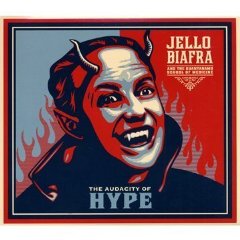After 30 years’ ceaseless fight against a system that traps him like an ant in a puddle of jam, you’d think it’d be cripplingly exhausting being Jello Biafra. But here he is, returning to music after years spent on mammoth spoken-word tours and grass-roots campaigning for the Green Party. Named in typically sardonic style, the Guatanamo School of Medicine – Jon Weiss (Sharkbait), Kimo Ball (Freak Accident), Ralph Spight (Victim’s Family) and Billy Gould (Faith No More) – make a big, muscular, mean sound over which Biafra inveighs against atrocity in his ageless, indignant warble.
The album’s title may be a clear reference to the US’s still-box-fresh Commander-in-Chief, but this is as much commentary on the new guy as you’re going to get. As far as Biafra’s concerned, the political landscape hasn’t changed, and eviscerating right-wingers, evangelists and corporations remains a priority. Indeed, the opener, ‘Terror of Tinytown’ enjoys a final dig at ol’ W. This may feel a tad redundant, given that the former prez now spends his days doodling in the dust on his Texan ranch. Nonetheless, Biafra calls for the ex-administration to be tried for war crimes and intimates that we haven’t seen the last of that charming bunch. With Palin’s dim star in the ascendancy, as the song closes, it’s hard not to shake the mental image of Ming the Merciless’s power ring at the end of Flash Gordon.
‘Clean as a Thistle’ returns to the wild-eyed, heavy-surf mania that made Dead Kennedys such a venomous proposition way back when. Lyrically, this is an attack on the hypocrisies of those using sexual puritanism as a political weapon, and contains the delightful visual image of "Republican buttocks flapping skyward in the wind". The album’s fastest, hardest (and possibly best) tune, ‘New Feudalism’ rides a monstrous riff that wouldn’t have been out of place on Lard’s relentlessly brutal classic The Last Temptation of Reid. And indeed, it is an older track, originally appearing on the sole release by Krist Novoselic’s No WTO Combo in 2000. Its chorus chant, ‘NAFTA-GATTcha’ is prime Biafra in four syllables. Who else could (or, indeed, would) write a super-catchy, ultra-concise speed-punk chorus, complete with acerbic pun, based on trade agreements?
‘Panic Land’ dissects the politics of fear, the reach of homeland security and associated totalitarian miseries. It has a fantastic, jerky pre-chorus and caustic, stop-start mid-section, but the main riff is so familiar as to distract from the lyrical content while you play spot the homage… without the vocals, this one could be a Stooges tribute band. Another No WTO tune, ‘Electric Plantation’ revisits the themes of redundancy, corporate greed and the prioritisation of profits over people so coldly summarised in DK’s ‘Soup is Good Food’. This reference is reinforced further by sinewy surf-punk guitar lines eerily redolent of East Bay Ray.
Jello’s past work continues to haunt throughout. ‘Pets Eat Their Master’ recalls ‘Chew’ from his Nomeansno collab, The Sky Is Falling and I Want my Mommy. Both are Brockman-esque chilling visions of things to come, in which ordinary citizens are eaten alive by the suddenly voracious by-products of a corrupt society. First time around, rats; now, a cannibalistic underclass. Relaying the horror against a super-fun but incongruous rockabilly groove, Biafra has never sounded more like Fred Schneider (which is saying something). The album closes on a rousing, anthemic note with ‘I Won’t Give Up’, a call to arms to political warriors and revolutionaries everywhere. Its refrain ("I won’t give up/It’s not an option") intentionally comes across like a patriot’s battle hymn – to the extent that you can imagine it being co-opted by Neo-con hawks.
Sometimes, the School of Medicine play it a little too straight. Their sound is not a million miles from Dead Kennedys – heavier and brawnier (a good thing, for sure), but not as exploratory or inventive. But still, it’s a fiery, forceful ensemble that easily ranks alongside Lard, Jelvins and Nomeansno as a fine post-DK project. However, it must be said that Jello Biafra is a man with certain obsessions, both musical and lyrical, and anyone familiar with his catalogue won’t find any huge surprises here. Big, chunky modern rock sonics aside, there’s little that you can’t imagine Jello recording 25 years ago. But surely he can be forgiven that – when it comes to attacking infected institutions and pustulent power structures with barbed wit, lucid insight and unrelenting viciousness, he’s still the only show in town.


